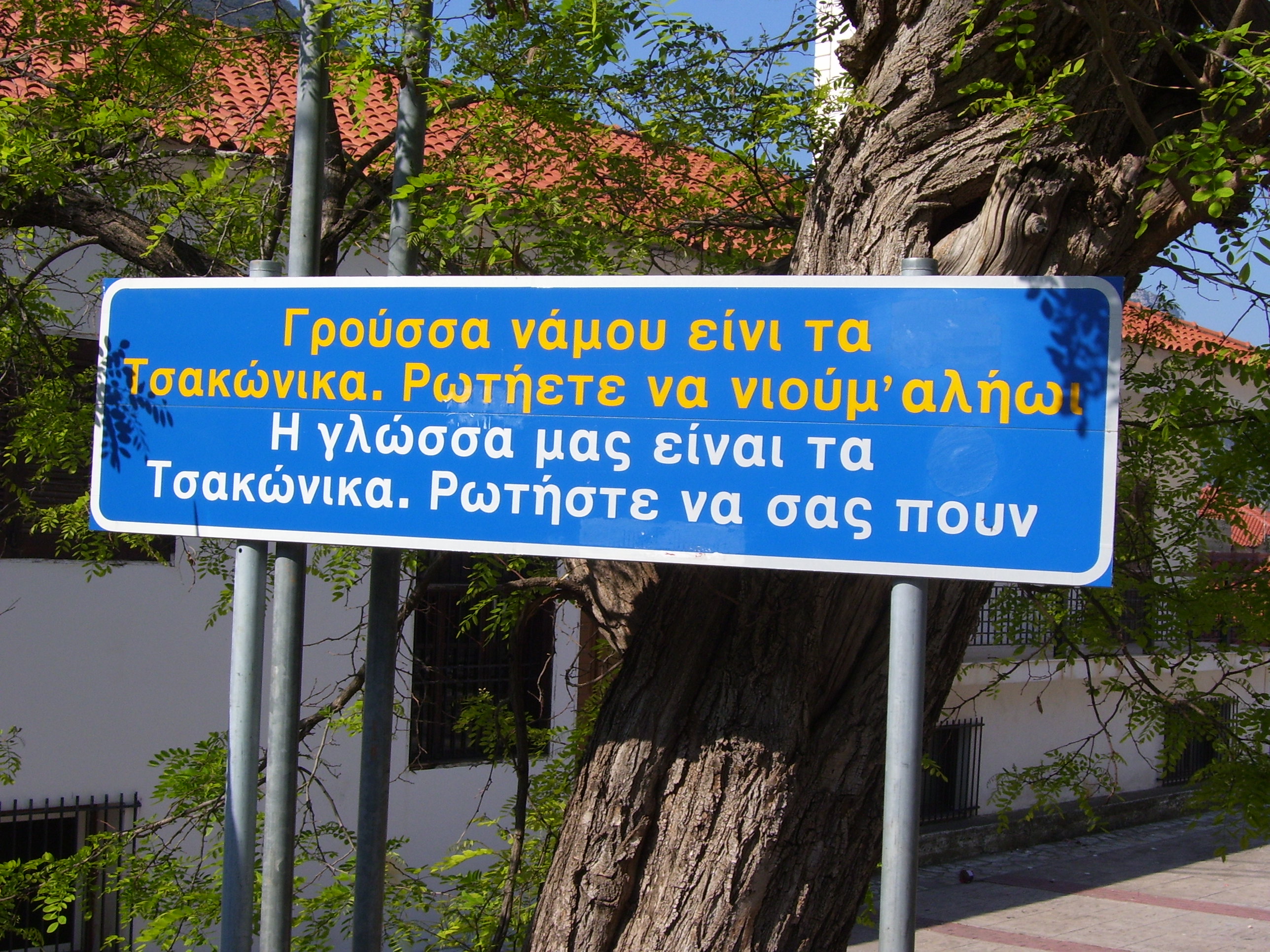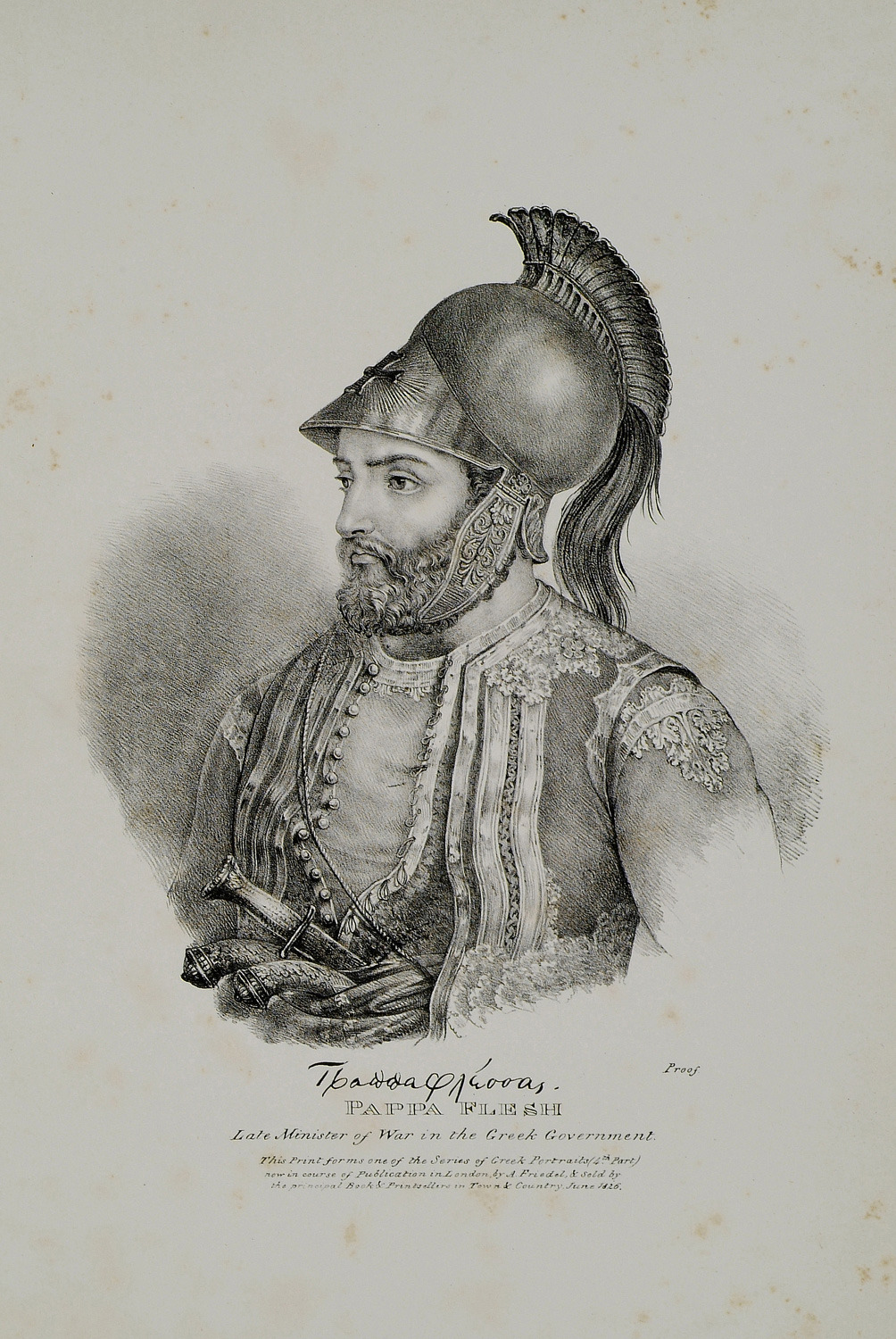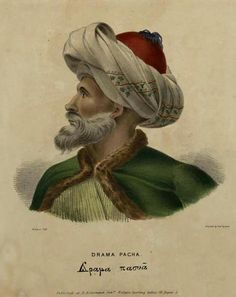|
Panagiotis Kefalas
Panagiotis Kefalas was a Greek fighter of the Greek Revolution of 1821. Biography He hailed from Dirrachi in the Androusa province, but was unrelated to the Kefalas magnate family. He took part in several battles of the Greek War of Independence, from the capture of Kalamata and Karytaina to the Battle of Valtetsi and the Siege of Tripolitsa, where he commanded a Tsakonian detachment with distinction. He also fought against Mahmud Dramali Pasha in 1822, and in Continental Greece. He fell at the Battle of Maniaki The Battle of Maniaki was fought on May 20, 1825 in Maniaki, Greece (in the hills east of Gargalianoi) between Ottoman Egyptian forces led by Ibrahim Pasha and Greek forces led by Papaflessas.Finlay, p. 75. "He quitted Nauplia with great parade ... in 1825. Sources * {{DEFAULTSORT:Kefalas, Panagiotis 19th-century Greek people 1825 deaths Greek people of the Greek War of Independence Greek military personnel killed in action People from Arcadia, Peloponnese< ... [...More Info...] [...Related Items...] OR: [Wikipedia] [Google] [Baidu] |
Maniaki, Messenia
Maniaki ( el, Μανιάκι) is a village in the municipality Pylos–Nestoras, Messenia, Greece. It was the place where the Battle of Maniaki The Battle of Maniaki was fought on May 20, 1825 in Maniaki, Greece (in the hills east of Gargalianoi) between Ottoman Egyptian forces led by Ibrahim Pasha and Greek forces led by Papaflessas.Finlay, p. 75. "He quitted Nauplia with great parade ... occurred on 1 June 1825. Populated places in Messenia Peloponnese in the Greek War of Independence {{Peloponnese-geo-stub ... [...More Info...] [...Related Items...] OR: [Wikipedia] [Google] [Baidu] |
Tsakones
Tsakonia ( ell, Τσακωνιά) or the Tsakonian region () refers to the small area in the eastern Peloponnese where the Tsakonian language is spoken, in the area surrounding 13 towns, villages and hamlets located around Pera Melana in Arcadia. It is not a formally defined political entity of the modern Greek state. Extent In his ''Brief Grammar of the Tsakonian Dialect'' published in 1951, Prof. Thanasis Costakis defines Tsakonia as the area from the town of Agios Andreas in Kynouria south to Leonidio and Tyros and inland as far as Kastanitsa and Sitaina, but asserts that in former times the Tsakonian-speaking area extended as far as Cape Malea in eastern Laconia. The principal town in Tsakonia at this time was Prastos, which benefited from a special trading privilege granted by the authorities in Constantinople. Prastos was burned by Ibrahim Pasha in the Greek War of Independence and was abandoned, with many of its residents fleeing to the area around Leonidio and Tyros or ot ... [...More Info...] [...Related Items...] OR: [Wikipedia] [Google] [Baidu] |
Greek People Of The Greek War Of Independence
Greek may refer to: Greece Anything of, from, or related to Greece, a country in Southern Europe: *Greeks, an ethnic group. *Greek language, a branch of the Indo-European language family. **Proto-Greek language, the assumed last common ancestor of all known varieties of Greek. **Mycenaean Greek, most ancient attested form of the language (16th to 11th centuries BC). **Ancient Greek, forms of the language used c. 1000–330 BC. **Koine Greek, common form of Greek spoken and written during Classical antiquity. **Medieval Greek or Byzantine Language, language used between the Middle Ages and the Ottoman conquest of Constantinople. **Modern Greek, varieties spoken in the modern era (from 1453 AD). *Greek alphabet, script used to write the Greek language. *Greek Orthodox Church, several Churches of the Eastern Orthodox Church. *Ancient Greece, the ancient civilization before the end of Antiquity. *Old Greek, the language as spoken from Late Antiquity to around 1500 AD. Other uses * '' ... [...More Info...] [...Related Items...] OR: [Wikipedia] [Google] [Baidu] |
1825 Deaths
Eighteen or 18 may refer to: * 18 (number), the natural number following 17 and preceding 19 * one of the years 18 BC, AD 18, 1918, 2018 Film, television and entertainment * ''18'' (film), a 1993 Taiwanese experimental film based on the short story ''God's Dice'' * ''Eighteen'' (film), a 2005 Canadian dramatic feature film * 18 (British Board of Film Classification), a film rating in the United Kingdom, also used in Ireland by the Irish Film Classification Office * 18 (''Dragon Ball''), a character in the ''Dragon Ball'' franchise * "Eighteen", a 2006 episode of the animated television series ''12 oz. Mouse'' Music Albums * ''18'' (Moby album), 2002 * ''18'' (Nana Kitade album), 2005 * '' 18...'', 2009 debut album by G.E.M. Songs * "18" (5 Seconds of Summer song), from their 2014 eponymous debut album * "18" (One Direction song), from their 2014 studio album ''Four'' * "18", by Anarbor from their 2013 studio album '' Burnout'' * "I'm Eighteen", by Alice Cooper commonly ... [...More Info...] [...Related Items...] OR: [Wikipedia] [Google] [Baidu] |
19th-century Greek People
The 19th (nineteenth) century began on 1 January 1801 ( MDCCCI), and ended on 31 December 1900 ( MCM). The 19th century was the ninth century of the 2nd millennium. The 19th century was characterized by vast social upheaval. Slavery was abolished in much of Europe and the Americas. The First Industrial Revolution, though it began in the late 18th century, expanding beyond its British homeland for the first time during this century, particularly remaking the economies and societies of the Low Countries, the Rhineland, Northern Italy, and the Northeastern United States. A few decades later, the Second Industrial Revolution led to ever more massive urbanization and much higher levels of productivity, profit, and prosperity, a pattern that continued into the 20th century. The Islamic gunpowder empires fell into decline and European imperialism brought much of South Asia, Southeast Asia, and almost all of Africa under colonial rule. It was also marked by the collapse of the large S ... [...More Info...] [...Related Items...] OR: [Wikipedia] [Google] [Baidu] |
Battle Of Maniaki
The Battle of Maniaki was fought on May 20, 1825 in Maniaki, Greece (in the hills east of Gargalianoi) between Ottoman Egyptian forces led by Ibrahim Pasha and Greek forces led by Papaflessas.Finlay, p. 75. "He quitted Nauplia with great parade, attended by a body of veteran soldiers; and when he reached the village of Maniaki, in the hills to the east of Gargaliano, his force exceeded three thousand men. The bold priest possessed no military quality but courage. He posted his troops in an ill-selected position and awaited the attack of Ibrahim, who advances in person to carry the position at the head of six thousand men on 1 June. Many of the archimandrite's troops, seeing the superior force of the Egyptians, deserted during the night, and only about fifteen hundred men remained. The pasha's regulars were led on to storm the Greek intrenchments in gallant style, and a short and desperate struggle ensued. The Greeks were forced from their position before they fled. The affair was ... [...More Info...] [...Related Items...] OR: [Wikipedia] [Google] [Baidu] |
Continental Greece
Continental Greece ( el, Στερεά Ελλάδα, Stereá Elláda; formerly , ''Chérsos Ellás''), colloquially known as Roúmeli (Ρούμελη), is a traditional geographic regions of Greece, geographic region of Greece. In English, the area is usually called Central Greece, but the equivalent Greek term (Κεντρική Ελλάδα, ''Kentrikí Elláda'') is more rarely used. It includes the southern part of the Greek mainland (sans the Peloponnese), as well as the offshore island of Euboea. Since 1987, its territory has been divided among the administrative regions of Greece, administrative regions of Central Greece (region), Central Greece and Attica (region), Attica, and the regional units of Greece, regional unit (former Prefectures of Greece, prefecture) of Aetolia-Acarnania in the administrative region of Western Greece. Etymology The region has traditionally been known as ''Roúmeli'' (Ρούμελη), a name deriving from the Turkish language, Turkish word ''R ... [...More Info...] [...Related Items...] OR: [Wikipedia] [Google] [Baidu] |
Mahmud Dramali Pasha
Dramalı Mahmud Pasha, (Turkish: ''Dramalı Mahmut Paşa''; c. 1770 in Istanbul – 26 October 1822, in Corinth) was an Ottoman Albanian statesman and military leader, and a pasha, and served as governor (''wali'') of Larissa, Drama, and the Morea. In 1822, he was tasked with suppressing the Greek War of Independence, but was defeated at the Battle of Dervenakia and died shortly after. Early life and career Mahmud was raised and educated at the Topkapi Palace at Istanbul. He participated in various campaigns throughout the Empire, rising to the rank of vizier and acquiring significant military skills. Enjoying the patronage of the Valide Sultan, he was eventually posted in his family's home province of Drama, succeeding his father Melek Mehmed Pasha as governor. From this he got his sobriquet ''Dramali''. In 1820 he was Pasha of Thessaly at Larissa and participated in the army of Hursid Pasha that was operating against the rebel Ali Pasha of Yannina. In the summer of 1821, as ... [...More Info...] [...Related Items...] OR: [Wikipedia] [Google] [Baidu] |
Siege Of Tripolitsa
The siege of Tripolitsa or fall of Tripolitsa ( el, Άλωση της Τριπολιτσάς, Álosi tis Tripolitsás, ), also known as the Tripolitsa massacre ( tr, Tripoliçe katliamı), was an early victory of the revolutionary Greek forces in the summer of 1821 during the Greek War of Independence, which had begun earlier that year, against the Ottoman Empire. Tripolitsa was an important target, because it was the administrative center of the Ottomans in the Peloponnese. Following the capture of the city by the Greek revolutionary forces, a massacre of its Turkish and Jewish population occurred. Background Situated at the center of the Peloponnese, Tripolitsa was the pre-eminent town in southern Greece, and the capital of the Morea Eyalet (first-level province of the Ottoman Empire) since 1786, which made it an important target for the Greek revolutionaries. Many rich Turks and Jews lived there, together with Ottoman refugees, such as Turks and Albanians from Vardounia (Β� ... [...More Info...] [...Related Items...] OR: [Wikipedia] [Google] [Baidu] |
Greeks
The Greeks or Hellenes (; el, Έλληνες, ''Éllines'' ) are an ethnic group and nation indigenous to the Eastern Mediterranean and the Black Sea regions, namely Greece, Cyprus, Albania, Italy, Turkey, Egypt, and, to a lesser extent, other countries surrounding the Mediterranean Sea. They also form a significant diaspora (), with Greek communities established around the world.. Greek colonies and communities have been historically established on the shores of the Mediterranean Sea and Black Sea, but the Greek people themselves have always been centered on the Aegean and Ionian seas, where the Greek language has been spoken since the Bronze Age.. Until the early 20th century, Greeks were distributed between the Greek peninsula, the western coast of Asia Minor, the Black Sea coast, Cappadocia in central Anatolia, Egypt, the Balkans, Cyprus, and Constantinople. Many of these regions coincided to a large extent with the borders of the Byzantine Empire of the late 11th cent ... [...More Info...] [...Related Items...] OR: [Wikipedia] [Google] [Baidu] |
Battle Of Valtetsi
The Battle of Valtetsi was fought on 24 May ( N.S.), 1821 in Valtetsi between the Ottoman army and Greek revolutionaries. Background The Greek War of Independence officially began on 25 March 1821. During the war, the city of Tripoli in Arcadia, central Peloponnesus, became a prime objective of the Greek revolutionary army. Only the warlike Maniots were experts in the art of battle. Besides the Maniots, only the Klephts who lived in the mountains and the Armatoloi, who had for centuries been hired by the local Turkish authorities initially to guard the mountain passes and later for the general keeping of law and order, were coherent military forces. During April 1821, the initially small Greek forces in the area were slowly augmented by men from the nearby villages who declared Kolokotronis as Archistratigos, the man of overall command. Immediately, Kolokotronis established armed camps near the villages of Levidi, Piana, Chrysovitsi, Vervena and Valtetsi which were forme ... [...More Info...] [...Related Items...] OR: [Wikipedia] [Google] [Baidu] |
Karytaina
Karytaina or Karitaina ( el, Καρύταινα or Καρίταινα) is a village and a community in Arcadia (regional unit), Arcadia, Greece. Karytaina is situated on a hill on the right bank of the river Alpheios, near its confluence with the Lousios. The village dates back to the Middle Ages, but its history is unknown before the Fourth Crusade, Crusader conquest ca. 1205. Karytaina became the seat of a Barony of Karytaina, barony under the Frankokratia, Frankish Principality of Achaea, and the Castle of Karytaina was built in the mid-13th century on a steep rocky outcrop by Baron Geoffrey of Briel. The area returned to Byzantine Empire, Byzantine control in 1320, and came under Ottoman Empire, Ottoman control in 1460. After a brief period of Republic of Venice, Venetian rule (1687–1715), Karytaina returned to Ottoman control, and prospered as an administrative and commercial centre. Karytaina and its inhabitants were among the first to rise up during the Greek War of Independ ... [...More Info...] [...Related Items...] OR: [Wikipedia] [Google] [Baidu] |





.png)